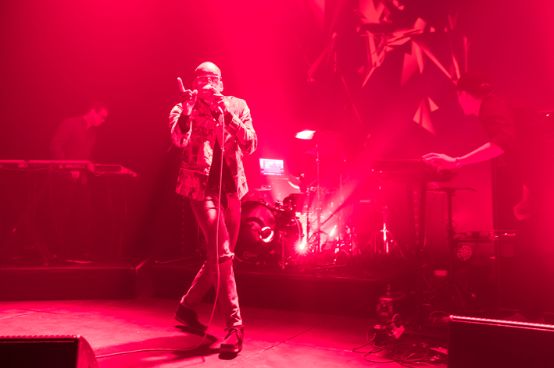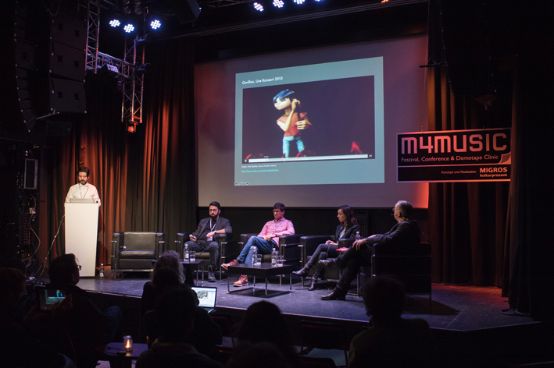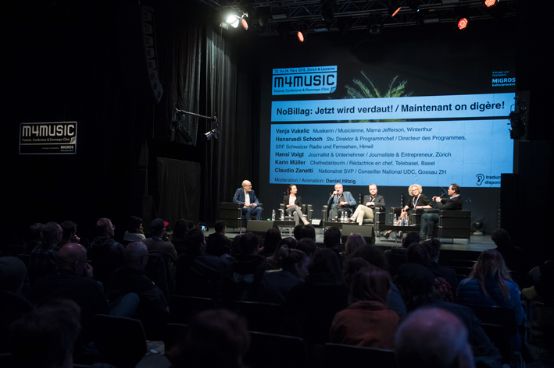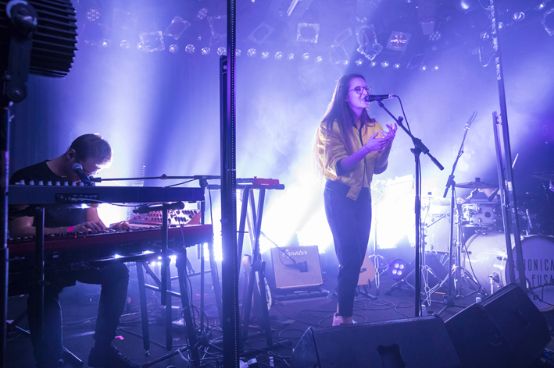Pop music and panels
The 21st edition of the m4music festival was attended not only by a good 6700 music fans, but also by around 1050 national and international representatives of the music industry. Panels on topics such as virtual reality, gender quotas and the future of Swiss concert venues were specially tailored to them.

The basic recipe from m4music The annual rendezvous of the Swiss music scene will feature discussions in the afternoon and live music in the evening. The three-day Migros Culture Percentage festival starts in Lausanne - not least in order to bridge the cultural divide between the two countries - and moves to the Schiffbau in Zurich the following day. The conference program there comprises twelve events, including the "Demotape Clinic" song competition.
-

Panel "Virtual Reality and Music". Photo: m4music/Ennio Leanza
Independent of time and space
Because various panels overlap, it is important to make a selection, such as the topic of "Virtual Reality and Music". Björn Beneditz, artistic advisor to Hamburg hip-hop band Deichkind, is certain that virtual reality (VR) will be the future of live concerts. This is because it not only expands the stage, but also provides insights into the area behind the stage. "What's more, thanks to virtual reality, shows can be experienced independently of time and space." Isabel Sánchez, Creative Content Manager at the Montreux Jazz Festival, proves that this is more than just a fantasy. "We have already recorded 15 concerts with VR cameras and the result was very, very impressive." Precisely because the previous business models are breaking away, record labels are open to innovative transmission options. "I also believe that the audience would rather wear a headset than stand at the back of a concert hall." From Björn Beneditz's perspective, VR is likely to be of particular interest to up-and-coming artists who work from their home studio and can transport their music directly into fans' homes thanks to this technology. "Bands that have already been successful for twenty years have less need for such an approach."
-

Panel "No Billag: Now it's time to digest!". Photo: m4music/Ennio Leanza
Not properly digested
The panel discussion "No Billag: Now it's time to digest!" turned out to be less than productive. Following the vote on the abolition of the public service, both Zurich SVP National Councillor Claudio Zanetti and the other panel participants mostly insisted on their well-known positions. The debate stagnated at the latest after Zanetti's interjection that the local media had a clear left-wing bias. The deputy director and program director of SRF, Hansruedi Schoch, describes the referendum as "fundamentally important". The result of the vote showed that there is no divide in Switzerland between the generations, between rural and urban areas or between different parts of the country. Perhaps the most important insight only comes towards the end, when Schoch explains: "Our competitors are not Tamedia or Ringier." But rather companies like Google or Facebook. Unfortunately, this point is not elaborated on.
Quotas for female acts
Early on Saturday afternoon, the discussion will revolve around "Gender, who cares?". Katja Lucker, Managing Director of the funding organization Musicboard Berlin and also Director of the Pop-Kultur Festival there, explains in her short presentation how Musicboard, with a budget of 3.6 million euros in 2017, focused on promoting female musicians and the queer scene. It was essential that all relevant committees and juries had at least 50 percent female representation. Regula Frei, Managing Director of the Helvetiarockt coordination office, points out that not a single event in Switzerland has yet signed up to the International Keychange Initiative. This initiative aims to oblige festivals to have 50 percent female and 50 percent male acts in their program by 2022. Philippe Cornu, responsible for the music program at the Gurten Festival in Bern, speaks of a controversial topic that is being discussed throughout Europe and admits: "The mindset has to change." For this year's Gurtenfestival, the aim was to have 30 percent female acts, but only 23 percent will be achieved.
Medium-sized clubs at risk
The debate on the "music club of tomorrow" is less contentious. Philippe Bischof, the new director of Pro Helvetia, says of the dying clubs: "The venues are facing a permanent challenge." Oliver Dredge, Managing Director of KIFF in Aarau, explains that not every club has to survive, but: "It is important that every city has a good venue." Medium-sized music venues like the KIFF are particularly at risk. Such venues often invest a lot of development work in new artists, but as soon as they are successful, they migrate to larger concert venues. Philipp Schnyder von Wartensee, festival director of m4music, believes that the future of clubs lies in their institutionalization.
Anxiety and depression
"Rock'n'Roll and Depression" was a rarely discussed topic: in his introduction, presenter Hanspeter "Düsi" Künzler referred to a 2016 study by the University of Westminster, which showed that 71% of musicians surveyed suffered from anxiety or depression. Florian Burkhardt, for example, who works as an author and musician, ignored all of his body's warning signs - until one day he could no longer stand up in the suburban train. Many therapies later, the 44-year-old now receives a disability pension and is dependent on medication: "I've already swallowed six pills today." The Brit Andy Franks, long-time road manager for bands such as Depeche Mode and Coldplay, lost his job because his alcohol problems got out of hand. He is now sober and has set up the "Music Support" foundation. It supports musicians who have addiction problems or are struggling with their mental health. He remembers: "On tour with artists like Robbie Williams, you are looked after day and night. But as soon as the concert tour is over, you're literally on your own."
-

Veronica Fuscaro. Photo: m4music
Musically more or less gripping
The theory and the many debates are followed - as befits a music festival - by plenty of live fare: while Zøla & The North know how to enrich their mixture of electronic, pop and rap with dense melodies on Friday evening, The Garden & The Tree don't manage to shake off their nervousness when they perform. Their actually lively folk-pop never really wants to pick up speed. Veronica Fuscaro's songs are far more impressive. Her pop songs, framed by quiet melancholy, are as warm as they are authentic. The concert by Rootwords is no less impressive, but of a completely different kind, captivating the audience with hard beats and socially critical lyrics. On the other hand, Pablo Nouvelle's Saturday and all too cozy electronica set is less intoxicating. Highlights are provided by Nakhane from South Africa, whose soul-infused electropop sounds almost painfully beautiful, and Zeal & Ardor: their blend of gospel and black metal is not only innovative, but also furious.
And what impression do the creators of this year's m4music edition have of the Swiss music scene? "It's very lively and diverse. We saw many strong concerts, for example by KT Gorique, Stereo Luchs, Monumental Man and Meimuna", summarizes festival director Philipp Schnyder von Wartensee. Of the panels he was able to attend, the one on gender left a particularly lasting impression on him. His conclusion for next year's festival is: "The gender discussion definitely needs to be continued."
On the YouTube channel "m4music1" you can follow various interviews and panels.








